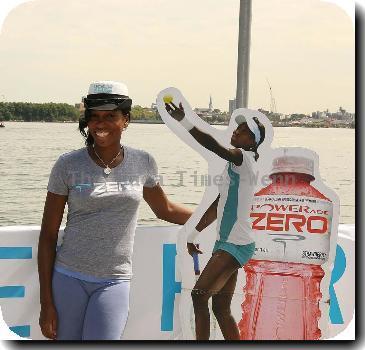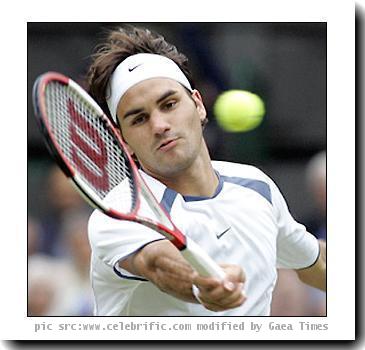Parenting and playing: Juggling tennis and fatherhood at Wimbledon can be a demanding match
By Christopher Torchia, APTuesday, June 22, 2010
Wimbledon is a major test for dads who are playing
WIMBLEDON, England — Back home, when Brazilian tennis player Marcos Daniel leaves his house to practice, his 3-year-old son sometimes asks if he’s taking another airplane. No, Daniel explains patiently, he’s just stepping out for a drive. The mention of “car” reassures the toddler.
“He knows I’m going to come back for lunch,” Daniel said after a five-set loss to Marsel Ilhan of Turkey in the first round of Wimbledon on Monday. His wife, son and 4-month-old baby girl weren’t there to see it. These past days, he kept in touch with online video chats from his hotel room.
The rigors of the professional tour are hard enough on players — shuttling from tournament to tournament, from airports to hotels, traveling and training, winning and losing. For the minority who are fathers, there is the added strain of leaving children behind for matches in distant cities.
Seven men in this year’s Wimbledon draw of 128 players are fathers. Four — No. 1-seeded Roger Federer, No. 15 Lleyton Hewitt, Michael Llodra of France and Taylor Dent of the United States — won in the first round. The remainder lost: Daniel, No. 17 Ivan Ljubicic of Croatia and No. 20 Stanislas Wawrinka of Switzerland.
Three mothers also competed: No. 8 seed Kim Clijsters is through to the second round; Rossana de los Rios of Paraguay lost to Venus Williams; and Sybille Bammer of Austria also lost.
Federer, whose twin girls turn 1 on July 23, seems to have little trouble juggling the demands and distractions of fatherhood with tennis, though as Wimbledon’s defending champion and the holder of 16 Grand Slam titles he is hardly the typical player.
The Swiss star has abundant resources at his disposal, traveling in a private jet and often bringing his family to tournaments. He won the Australian Open in January but has since faltered, by his standards, and barely survived a five-setter against Alejandro Falla of Colombia on Centre Court.
Asked what it was like to be a father at Wimbledon, Federer said:
“Good. I can come back anytime. I’m a member. I can be a dad anytime at Wimbledon now. It’s great being here with the kids and Mirka after last year’s time where she was pregnant. It’s nice to be back as a family.”
Wawrinka, Federer’s friend and doubles partner in winning the gold medal at the Beijing Olympics, became a father to daughter Alexia in February. He went down in five sets to Uzbekistan’s Denis Istomin, who won in his Wimbledon debut.
“I try to travel a little bit with my family, but actually they are not here this time,” Wawrinka said. “But that’s fine. I’m pretty happy with my game.”
Ljubicic said he was trying to develop the routine of having a bath every evening with Leonardo, who turns 2 in November. The boy recognizes tennis on television, and even knows a few of the players on the circuit. Ljubicic, who won his first Master Series title at Indian Wells this year, said life as a father was the same for professional athletes as it was for everyone else.
“It’s definitely a different lifestyle, completely,” he said. “Sometimes you have sleepless nights.”
Llodra, who has a 6-year-old daughter and a 3-year-old son, said it was “tough to live, especially when they are at a good age to understand” and that his family joins him for part of the year during the hard-court season in the United States. January was tough, he said, because he has to spend several weeks away during tournaments leading to the Australian Open.
He said that if his wife was away from the computer during online chats with his children, he sometimes acts as the “police” and tells them to get to bed. His daughter will start school this year, making it harder for her to travel with her father.
Dent, an American with a serve-and-volley game, has a 5-month-old boy and his family is in Kansas City now with his mother-in-law. They planned to come to Wimbledon, but his son’s sleep patterns have been irregular and his parents spared him the long trip. Dent looks forward to the U.S. summer circuit because it will be easier to spend time with his family on the road.
He doesn’t think being a parent undermines his tennis.
“I’m too mature. I’m too hungry to want to win to let it negatively affect me,” Dent said. “I’m going to do my training as always and I’m going to focus on my tennis as always. Hopefully it will be a nice complement to, you know, just the mental drain it is being out here.”
Hewitt is the dean of tennis fathers. He and his wife, Bec, are expecting their third child in December.
Clijsters’ feat of winning the U.S. Open as a mother is all the more extraordinary, and she coasted through her first round at Wimbledon. A nanny helps her when she travels with her 2-year-old daughter, Jada, and Clijsters usually prepares breakfast an hour before the girl wakes up.
“It’s the weeks I go to tournaments that I know tennis is important, and that’s when I really focus on tennis,” Clijsters said.
In the end, results on the court can affect how well players handle parenthood and separation on the tour. Daniel, ranked 108th in the world, said it’s especially tough on South American players in Europe, a long, expensive trip from home.
“It’s getting difficult,” he said. “Sometimes you just feel a little bit down after many years on the tour.”
Tags: Australian Open Tennis Championships, England, Events, Holidays, Men's Tennis, North America, Occasions, Parenting, Relationships, Roger federer, United States, Venus williams, Wimbledon, Wimbledon Championships, Women's Sports, Women's Tennis



